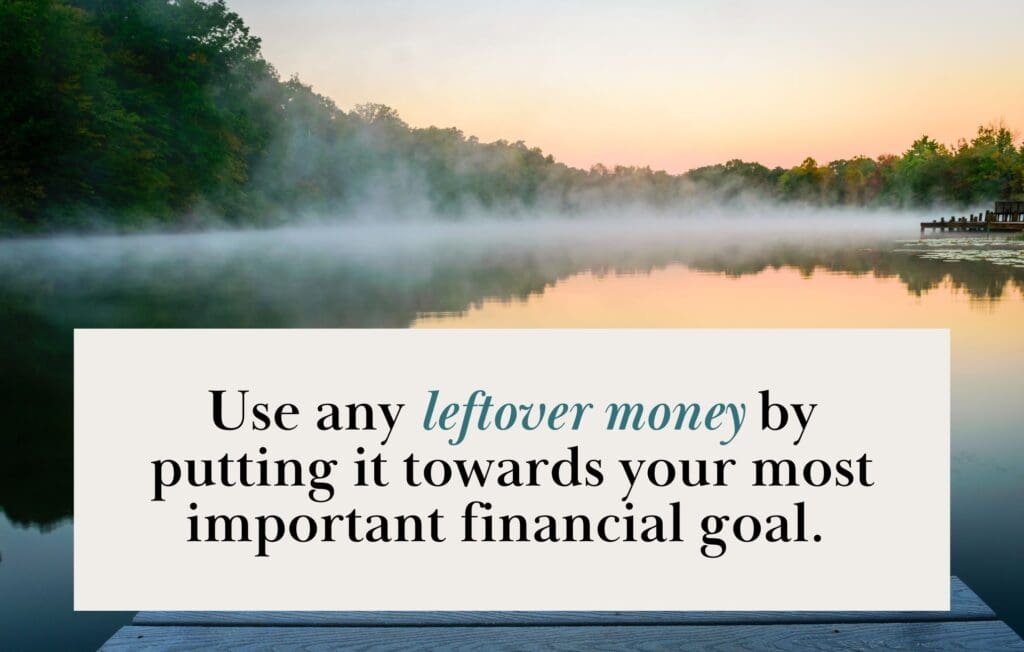How I Approach Budgeting and Manage “Leftover” Money
Let’s talk about how to use leftover money in your budget. First, this is a great problem to have!
You’ve been budgeting carefully, allocating money to various categories. But at the end of the month, you’ve got “leftover” money. What to do? That’s what we’ll cover in today’s post about budgeting.
If you’re wondering what to do with extra money…keep reading! (And watch the video at the end for extra tips.)
Written By Tiffany Woodfield, Financial Coach, TEP®, CRPC®, CIM®

My Budgeting Backstory
When I first started budgeting many years ago — long before I became a financial advisor — I would often find myself with “leftover” money at the end of the month.
At first, when I discovered the extra room in my budget at the end of the month, I got excited. It was like I had just found cash in a jacket I hadn’t used for a long time!
The temptation was to spend it because, technically, it is leftover.
In my mind, it was like leftovers from dinner that I wanted to clean out of the fridge before they could go bad.
So I zipped out to spend this money, but it didn’t feel as great as I expected. I had been diligent with my budgeting, and then the first minute I got a “little” extra, I went out to spend it without thinking.
I felt like I was cheating.
So the next time I had leftover money, I remembered that experience, and instead, I chose how to use it more intentionally.
I looked back at the past month to see if my budget calculations were accurate and if I could be putting more money in one of the budget categories. Then, I reminded myself of how much I wanted to achieve the long-term goal I was saving towards.
I made my goal a clear picture in my mind, so I knew that the sacrifices today would be worth it in the long term.
Then, I adjusted my budget so I wouldn’t have to be tempted each month with a lot of leftover money.
The ironic thing was the feeling I got after making this decision was way better than when I made the purchase the month prior. I felt secure and powerful, as if I had a say in creating my financial future. Which we do!
So, how should you use leftover money in your budget?
I recommend that you try zero-based budgeting.
If you do this, you’ll ensure that there isn’t any leftover money. All your money will be accounted for and you’ll be putting money towards your saving and investing goals as well as covering your fixed expenses and enjoying yourself with some spending money.
You can use my experience as inspiration to figure out how to adjust your budget so that every dollar has a home.
If you need more guidance, I recommend reading my comprehensive guide on budgeting and the 50-30-20 rule.
If you just want a simple answer, use any leftover money by putting it towards your most important financial goal.

Questions about Budgeting
Is it better to pay off debt or save the leftover money?
This decision is easy once you look at what your debt costs you versus how much you earn from savings.
For example, if your credit card debt is costing you 22% interest and you can only earn 4% in your savings account, the choice becomes clear: pay off the debt first.
What are the best ways to invest leftover budget money?
If you know you’ve got enough money to cover your fixed expenses, you can invest the leftover money in short-term investment such as CDs, GICs, money market accounts, government bonds, treasury bills, or high-yield savings accounts.
The most important consideration is how liquid the asset is and how quickly you can convert it into cash.

Should I use leftover money for home improvements or luxury purchases?
While using leftover money for home improvements or luxury purchases can be tempting, these purchases are expensive and should be considered a goal you are working towards, not something you use leftover money on. And let’s not forget that most home improvements go over budget!
How can I use leftover money to prepare for future financial challenges?
Life throws us curve balls, so the rule of thumb is to have an emergency fund to cover expenses for 3-6 months. If you are paying down debt, this amount will be less, but it is a good goal post.
What should I do with unexpected windfalls or bonuses?
When you get a big tax return or a bonus from work, the temptation is to spend it because you say to yourself, “I deserve it.”
So, you first need to acknowledge that you deserve it and how good it feels to have money in the bank.
Next, get curious about how this financial windfall will move you closer to the goal you’ve been working towards. You want to make it clear in your mind how good it will feel to achieve this rather than saying, “I got this windfall and all I have to do is save it.”
One perspective makes you feel empowered, and the other makes you feel a sense of lack.
I love games, and for me, I would imagine the game Snakes and Ladders and say to myself, “Tiffany, you just landed on a square with a ladder that leads you ahead much faster.”
I would remind myself how much closer I was to my goal. Remember if you need a little reward, this is allowed. Just make sure you allow the rest of the windfall to take you up the ladder.
Are there tax considerations when using surplus money for investing?
One of the biggest considerations of any investment, whether it is in the stock market or real estate, is the tax impact.
If you invest $100 and you earn 8%, how much of that increase do you have in your pocket after tax?
Investment earnings, dividends, capital gains and interest are each taxed differently and need to be considered along with your timeline. It’s important that you speak to your accountant and financial advisor when investing large amounts of money.
Quick Video: Zero-Based Budgeting Basics
Zero-based budgeting can be a smart way to ensure you’re saving, investing, and putting money towards credit card or other debts as well as enjoying your life!
Get the Free Guide and Audio Meditation for Manifesting Your Dreams
Pop your email address in the form below to get my easy checklist and guide to manifesting and the guided audio meditation to help you get started.
You’ll also get one or two emails per month with the latest blog posts about abundance, wealth-building, manifesting, and creating a fulfilling life.
Related Articles
💎 The 1/3 Rule of Budgeting and How to Use It the Right Way
💎How Much To Budget for Fun Money
💎How To Budget Money with a Spouse Who Spends Too Much
About the Author

TIFFANY WOODFIELD is a financial coach, cross-border expert, and the co-founder of SWAN Wealth based out of Kelowna, BC. As a TEP and associate portfolio manager, Tiffany has extensive experience working with successful professionals who want to leave a legacy and enjoy an adventurous, work-optional lifestyle. Tiffany combines extensive knowledge from her background as a financial professional with coaching and her passion for personal development to help her clients create a unique path that allows them to live their fullest potential. Tiffany has been a regular contributor to Bloomberg TV and has been interviewed by national and international publications, including the Globe and Mail and Barron’s.